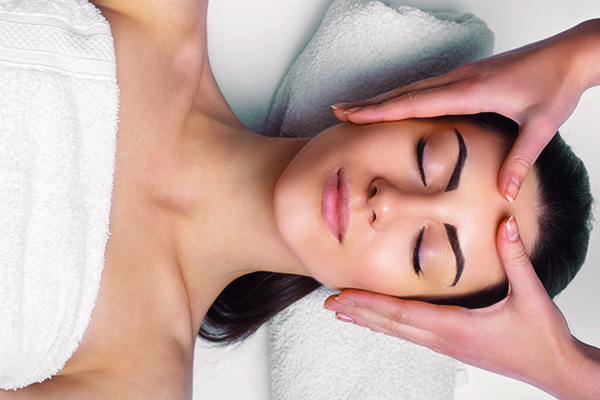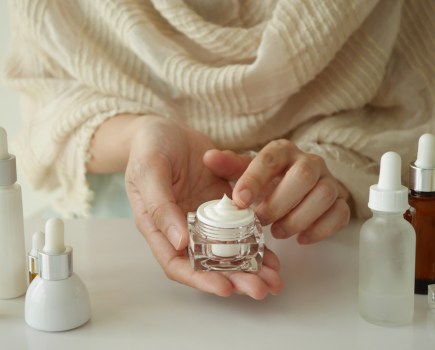Find out how German skincare combines natural ingredients and innovative technologies for highly effective products.
Heard about G-beauty? Yes, it’s time to ditch the lengthy routine required of K-Beauty and jump on board the trend for German skincare.
To be fair, German beauty isn’t something that’s come from nowhere. You’ve probably been relying on cult German classics all your life without realising it.
We’ve all owned a little blue tin of Nivea cream at some point. They sell almost 150 million every year!
It’s this rich heritage, plus an enduring respect for natural ingredients and forward-thinking technologies that make German skincare so effective.
‘German women are interested in the health of their largest organ: the skin,’ says Nicoline Wöhrle of beauty brand Dr Hauschka’s parent company WALA.
‘It’s important they can trust in the efficacy of the products and scientific expertise of a brand.
‘They care about the sustainability and responsibility of the brand for the environment and our planet. There’s a long tradition in Germany for a green lifestyle and respecting the environment.’
Since 1967, Dr Hauschka has harnessed healing plants in its skincare. The brand uses organic and biodynamic farming methods to produce high-quality plants in a sustainable way.
Trust in nature
 ‘German women trust in the efficacy of nature for their health and the health of our planet,’ says Nicoline.
‘German women trust in the efficacy of nature for their health and the health of our planet,’ says Nicoline.
This is demonstrated by the fact that last year the natural and organic section of the German beauty market recorded the fastest growth. It was up 5.9 per cent, while the rest of the cosmetics market stagnated.
Here in the UK, German brands are readily accessible. While you won’t see flashy packaging or gimmicks, you will find simple-looking products that clearly state the ingredients. They only make claims that scientific research backs up.
German technology harnesses amino acids, vitamins, lipids and molecules naturally occurring in your skin and body for beauty benefits.
Nivea uses creatine to energise skin, Q10 to protect from cellular damage, and gluco-glycerol to improves skin cells’ natural moisturising ability. So don’t be fooled by plain appearances – there’s a whole lot of good stuff within the packaging that you’ll want to stock up on!
Ingredients insider
Germany has a long tradition of using healing plants in skincare but also combining these with hi-tech applications. Look out for:
CHAMOMILE
German chamomile is a common variety that contains bio-active ingredients including various flavonoids. It has anti-inflammatory properties which are useful in skincare.
CORNFLOWER
The national flower of Germany, cornflower produces a calming water that can soothe skin. Its antioxidant properties relieve itching and puffiness in eye creams.
ROSEHIP
This is the fruit of the dog rose. People say that Emperor Charlemagne’s son planted one of these in AD850, which is still growing in Hildesheim, Germany. It gives some testament to its hardiness. Rosehip seed oil is high in fatty acids, which smooth fine lines.
SILVER BIRCH
Native to Germany, this tree’s bark has been used for centuries to regenerate skin. Today beauty brands prize the leaves and sap for their astringent and anti-inflammatory properties.
Brands to watch
A pharmacist and a chemist founded superbrand Nivea in Hamburg in 1911. A chemist from Munich helped to set up Weleda, originally a Swiss/German brand.
Babor, founded in 1956 by physician Michael Babor, is another heritage brand. Its focus on pioneering techniques resulted in it being the first to develop ampoules that target specific skincare concerns.
Dr Erich Schulte founded QMS in 1986. The products and treatments focus on delivering collagen deep into the epidermis to improve elasticity.
More recently, stem cell scientist Professor Augustinus Bader set up his eponymous brand. Its products use patented ingredients to trigger tissue repair.
Dr Barbara Sturm, an aesthetic doctor who’s famed for her vampire facials, has a luxury skincare line harnessing potent ingredients. Dermatologist Dr Timm Golueke has created anti-ageing brand Royal Fern.
Germany is home to familiar natural brands plus more niche ones. So look out for
Dr Hauschka, Lavera, Kneipp and Dr Scheller, however, if you are looking for make-up brands to covet try Art Deco and Zoeva.







